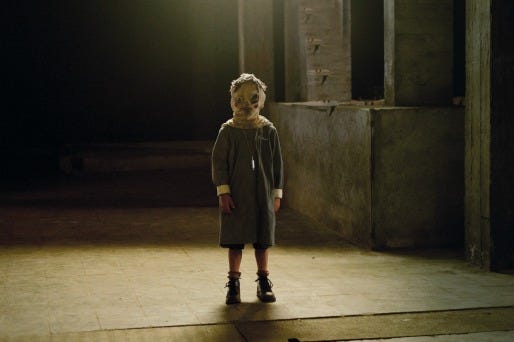No Sleep October: The Orphanage (2007)
“Every love story is a ghost story.”
I'm rather fond of the saying. No one is quite sure where it came from. I happened to find it on my bookshelf, sitting there as the title of an autobiography of David Foster Wallace. It's stuck in my mind, and it seems to fit "The Orphanage," a strange, scary, sad ghost story about a mother and her son.

"The Orphanage" stars Belen Rueda as Laura, a former orphan who returns to the orphanage where she grew up, since abandoned, with plans to renovate it into a care center for sick children. She and her husband, Carlos (Fernando Cayo), personally adopted a young HIV-positive boy named Simon (Roger Princep), who has severe behavioral problems. Although she cares for Simon, she is overwhelmed by his acting out, sometimes ignoring his outbursts for the sake of her own peace and quiet. Most difficult to deal with are Simon's imaginary friends ... and the half-dozen or so he makes after moving into the Orphanage. These "friends" encourage his bad behavior, and he ends up going missing. Laura descends into obsession and madness trying to find her son. Does she dare ask the ghosts for help? Isn't that crazy?
It sounds boilerplate. It kind of is. But what I found most interesting wasn't the ghosts, or the setting, or even the mystery of why those children haunt the manor. What “The Orphanage” did to stick with me is create an aura of legitimate sadness. I don't get that from most horror films. Sure, I empathize when watching them. I don't enjoy watching innocent campers slaughtered or teenagers terrorized. To me, that doesn't make me sad. Sadness is a brief but insistent flesh-wound on the mind. It doesn't burrow in like depression or linger like melancholy.
It's resignation to the reality of an unavoidable despair.
Laura's story is, from start to end, sad. It's hard to describe without spoiling the film, but I'll try.
To me, a ghost story needs two elements. First and foremost, ghost stories are about unseen presences with human qualities (wants, needs, desires) impacting the lives of the human protagonists. They can be benevolent, malicious, helpful or hurtful. They can be terrifying or beautiful. They can have their own motivations or be simply be inanimate presences weighing on the human character's conscious. All that matters is that they're there, but not. Second, but less important, is that the ghosts have to have a human resolution available to their character arc. They have to want something. Oftentimes, but certainly not always, this comes in the form of a "second death," through redemption or moving on.
Have you ever had the experience of loving someone, of feeling their influence on your decisions even when they weren't there, only to realize later on that you were really making decisions on false pretense, to please a fabricated version of the person for whom you were living? Love stories externalize that conflict between fact and fiction. Even when faced with the truth, it's difficult to eject that lingering notion of a person. It's hard to forget a ghost.
In “The Orphanage,” Simon goes missing a little ways into the film. His physical absence is nothing compared to the presence he becomes in Laura's mind. The bulk of the film is concerned with her search for him. Although we don't learn his fate until the final moments, Simon is never really gone from the film. He is the catalyst for Laura's story. Her quest for him, driven by a mother's love for her child, is harrowing. But it's a blind kind of love, a love that sometimes leads her in the wrong direction. The resolutions of her quest and the realizations she comes to about herself and Simon's true fate, versus what she had expected, epitomize the falsities at the heart of a love story.
In a way, that's why I found “The Orphanage” so sad more than anything else. While it has scares, it's ultimately about the consequences we've all felt watching, or experiencing, a tragic love story. It doesn't distract from the emotional substance of the story with too many shocks or, really, any sort of gore. Each scene in the narrative simply plays towards the final, inevitable conclusion. It pays off. It leaves us hurt, maybe a little broken.
It's a great love story. It's a great ghost story.
It kept me up that night.


